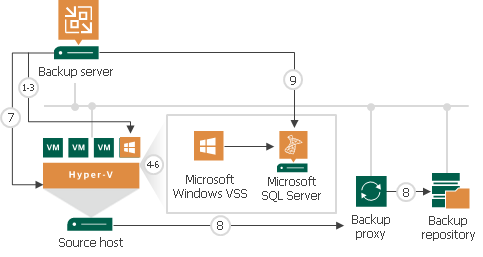 This is an archive version of the document. To get the most up-to-date information, see the current version.
This is an archive version of the document. To get the most up-to-date information, see the current version.Application-Aware Processing
By default, Veeam Backup & Replication does not process application logs and creates a crash-consistent backup of VMs with applications that use transaction logs for operations. You can create a transactionally consistent backup - in this case Veeam Backup & Replication will process application logs. In case a disaster strikers, Veeam Backup & Replication will use backups of logs to perform recovery operations.
To create transactionally consistent backups or replicas of VMs that run Microsoft Active Directory, Microsoft SQL Server, Microsoft SharePoint, Microsoft Exchange or Oracle, you must enable application-aware processing in job settings.
Application-aware processing is the Veeam technology based on Microsoft VSS. Microsoft VSS is responsible for quiescing applications on the VM and creating a consistent view of application data on the VM guest OS. Use of Microsoft VSS ensures that there are no unfinished database transactions or incomplete application files when Veeam Backup & Replication triggers the VM checkpoint and starts copying VM data to the target. For more information about Microsoft VSS, see Microsoft Docs.
Application-aware processing for Microsoft Windows Server versions is supported by corresponding versions of Microsoft Hyper-V (see Microsoft Docs). To use application-aware processing, you must have Hyper-V Integration Services and the latest updates installed on the VM guest OS.
Important |
If a VM runs an application that does not support Microsoft VSS (there is no VSS writer for this particular type of application, for example, MySQL), Veeam Backup & Replication will not be able to utilize Microsoft VSS and application-aware processing for this VM. To process such VMs, you can use Microsoft Hyper-V guest quiescence with pre-freeze and post-thaw scripts. For more information, see Microsoft Hyper-V Guest Quiescence and Pre-Freeze and Post-Thaw Scripts. |
How Application-Aware Processing Works
If you enable application-aware processing in job settings, Veeam Backup & Replication performs the following operations as a part of the backup or replication process:
- Veeam Backup & Replication deploys the non-persistent runtime components or, if necessary, persistent agent components on the VM and detects if the VM runs any of the supported applications.
- Veeam Backup & Replication collects information about applications installed on VMs — this information is required for VSS-aware restore.
VSS-aware restore is performed when the VM is started after you restore it from the backup or fail over to a VM replica.
- Veeam Backup & Replication prepares applications for VSS-aware restore.
- Microsoft VSS communicates with applications and quiesces I/O activities at a specific point in time.
- Microsoft Hyper-V VSS requestor triggers a VM VSS snapshot.
- Microsoft VSS resumes quiesced I/O activities on the VM guest OS.
- Veeam Backup & Replication triggers a snapshot for the volume on which the VM is located.
- The job session proceeds as usual.
- If you have instructed Veeam Backup & Replication to truncate transaction logs, Veeam Backup & Replication truncates transaction logs on the VM guest OS after the backup or replica are successfully created.

Related Topics